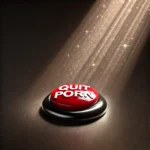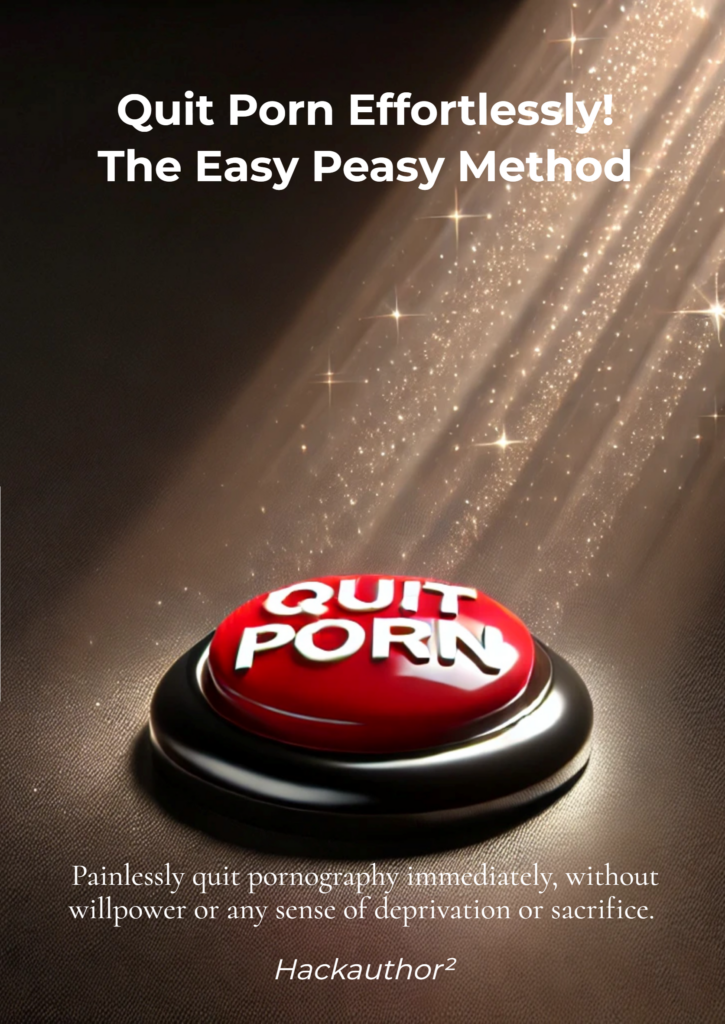Breaking the Porn Illusion
Now, let me ask you this: have you ever tried to quit something and felt that nagging sense of missing out? Like, you’ve cut ties with something toxic, and yet there’s a voice in the back of your head saying, “But what if I need it? What if life isn’t as good without it?” That’s deprivation in a nutshell, and it’s one of the sneakiest hurdles when quitting an addiction like pornography. It convinces you that you’re losing something valuable, even though, spoiler alert, you’re not.
Uncover the truth about the porn illusion. Learn the Easy Peasy method to break free, reframe cravings, and reclaim your confidence and freedom.
Hackauthor
Here’s the deal: this feeling of deprivation? It’s not rooted in reality. It’s the result of years of brainwashing. I know “brainwashing” sounds dramatic, but think about it—pornography has been sold to us as something harmless, maybe even beneficial. It’s marketed as a quick fix for stress, boredom, or loneliness, and over time, we start believing it really works. But does it? Let’s break down those myths and tackle deprivation head-on.
First off, let’s bust the biggest myth of all: that pornography brings real pleasure. I know, I know—it feels like it does. But here’s what’s really happening. The “pleasure” you think you’re getting from porn isn’t genuine satisfaction. It’s just the temporary relief of withdrawal symptoms caused by the addiction itself. You feel better for a moment, but only because you’ve fed the craving. It’s like scratching an itch—it doesn’t solve the underlying problem. Once you understand this, it’s a game-changer. You’re not giving up something pleasurable; you’re stepping away from a cycle that’s been tricking you all along.
Now, here’s where the magic happens: shifting your mindset. So many people approach quitting as if they’re making a big sacrifice, but let’s reframe that. What if quitting isn’t about losing something, but gaining everything? Freedom from cravings. Mental clarity. Self-respect. Better relationships. More time and energy for the things that truly matter. When you stop focusing on what you think you’re giving up and start seeing all you’re gaining, deprivation starts to lose its grip.
Let’s talk about those pesky withdrawal pangs, though, because they’re a big part of why people feel deprived. When you quit, your brain goes through a little rebellion. It craves the hit it’s used to getting, and when it doesn’t get it, you feel restless or uncomfortable. But here’s the good news: those feelings are temporary. They don’t last forever. In fact, they’re a sign that your brain is healing. Instead of seeing them as proof that you’re deprived, see them as proof that you’re recovering. You’re purging the addiction, and that’s something to celebrate.
Another thing that feeds into deprivation is the brainwashing we’ve absorbed from society. Everywhere you look, there’s this message that pornography is just a natural part of life. Movies, TV, social media—even conversations with friends—can make it seem like porn is harmless or even necessary. But is it? Let’s get real: porn doesn’t add anything meaningful to your life. It takes away. It creates a cycle of craving and relief that leaves you drained, dissatisfied, and stuck. Breaking free isn’t losing out—it’s waking up.
And here’s a little trick I love: focus on the positive. Instead of dwelling on what you think you’re giving up, turn your attention to what you’re gaining. Better energy. Improved relationships. A sense of control over your life. Even your confidence gets a boost when you’re no longer tied to something you know isn’t good for you. The more you notice these benefits, the less you’ll feel like you’re missing out. Trust me, it works.
One of the coolest insights from the Easy Peasy method is reframing the whole withdrawal experience. Instead of seeing it as a struggle, what if you saw it as a victory? Every craving you resist is a win. Every day you go without porn is proof that you’re stronger than the addiction. It’s not about deprivation—it’s about progress. Celebrate those little wins, because they’re adding up to something amazing.
Oh, and here’s a word of caution: watch out for substitutes. It’s tempting to turn to “soft” pornography or even non-pornographic sexual fantasies as a way to fill the void, but here’s the thing—they keep the addiction alive. It’s like trying to quit sugar but still sneaking in a donut here and there. True freedom comes when you cut all ties. That might sound scary, but trust me, it’s worth it. Once you’re free, you won’t feel the need to rely on anything like that anymore.
One last tip: be prepared for moments of temptation. They’ll happen. Maybe it’s a bad day, maybe you’re bored, or maybe you stumble across something triggering online. Whatever it is, remind yourself that temptation is temporary. It passes. And every time you choose not to give in, you’re strengthening your ability to say no the next time. You’re proving to yourself that you don’t need it, and that’s incredibly empowering.
So, let’s wrap this up. The sense of deprivation that comes with quitting porn? It’s not real. It’s an illusion created by addiction and reinforced by years of societal conditioning. But you’re not losing anything by quitting. You’re gaining everything. Freedom. Confidence. Peace of mind. The ability to live a life that’s truly yours, unshackled from cravings and false promises. That’s what’s waiting for you on the other side.
If you’re on this journey, know that you’re not alone. And if this episode has resonated with you, share it with someone who might need to hear it. Together, we’re breaking free from the lies of addiction and stepping into something so much better. Thanks for hanging out with me today. Until next time, celebrate your progress, stay curious, and remember—you’ve got this.







